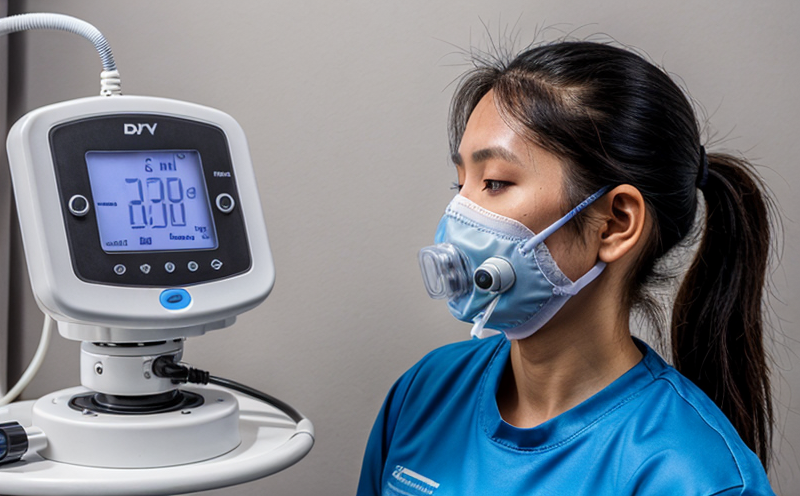ISO 5360 Anaesthetic Reservoir Bag Biocompatibility Testing
The ISO 5360 standard is a crucial guideline for ensuring that anaesthetic reservoir bags are safe and biocompatible, which is paramount in the medical device sector. These devices are designed to deliver gases such as oxygen or nitrous oxide into an anaesthetic breathing circuit during surgical procedures. The biocompatibility of these materials directly impacts patient safety by preventing adverse reactions.
The testing process under ISO 5360 involves several critical steps that ensure compliance with the standard and provide a high level of confidence in the device's safety. The first step is to select appropriate specimens from batches or lots, ensuring they are representative of the production run. This selection process requires careful attention to ensure that any potential variability within the batch does not affect the test results.
Once the specimen has been prepared and characterized according to ISO 5360, it undergoes a series of biocompatibility tests designed to evaluate its interaction with biological systems. These tests include in vitro cytotoxicity testing, sensitization, irritation, and intracutaneous reactivity. Each test is conducted following the specific protocols outlined in ISO 5360 to ensure consistent and reliable results.
After completing these initial biocompatibility assessments, it may be necessary to conduct additional tests such as subchronic toxicity studies or genotoxicity testing if preliminary data indicate that further evaluation is required. These extended evaluations help to identify any potential risks associated with long-term exposure to the materials used in anaesthetic reservoir bags.
The selection of appropriate test methods and conditions is critical during this phase, as it directly influences the accuracy and relevance of the results obtained. For instance, the choice between acute and subacute toxicity tests depends on the expected duration of patient contact with the device. Similarly, selecting the right animal models can provide insights into human responses while minimizing ethical concerns.
Finally, after completing all required biocompatibility testing, a comprehensive report summarizing the findings is prepared. This document provides detailed information about each test conducted, including methodology, results, and interpretation of those results in relation to ISO 5360 requirements. It serves as a valuable resource for regulatory submissions and internal documentation purposes.
Compliance with ISO 5360 ensures that anaesthetic reservoir bags meet stringent safety standards, protecting both healthcare providers and patients. By adhering to these guidelines, manufacturers can demonstrate their commitment to producing high-quality medical devices that contribute positively to patient care environments.
Applied Standards
| Standard | Description |
|---|---|
| ISO 5360:2017 | This standard specifies the biocompatibility requirements for materials used in anaesthetic reservoir bags. It outlines specific tests that must be conducted to ensure the safety and compatibility of these devices. |
| EN ISO 10993-1 | This European standard provides general requirements for biological evaluation of medical devices, which aligns closely with the principles outlined in ISO 5360. Both standards require manufacturers to demonstrate that their products do not cause harm when used under normal conditions. |
| ASTM F712-18 | This American standard offers additional guidance on biocompatibility testing, particularly focusing on the use of in vitro methods for assessing cytotoxicity and sensitization. While not directly applicable to ISO 5360, it complements the international standards used globally. |
| IEC 60601-2-29:2018 | This standard addresses the electromagnetic compatibility of medical devices, ensuring that they operate safely without causing interference to other electronic equipment. Although primarily concerned with electrical aspects rather than biocompatibility, it plays an important role in maintaining overall device safety. |
| USP | The United States Pharmacopeia provides specific requirements for the testing of materials used in pharmaceutical packaging and delivery systems. These guidelines are particularly relevant when considering the compatibility between anaesthetic reservoir bags and medications administered through them. |
Eurolab Advantages
At Eurolab, we specialize in providing comprehensive biocompatibility testing services that meet or exceed international standards like ISO 5360. Our team of experienced professionals offers expert guidance throughout the entire testing process, ensuring that you receive accurate and reliable results. With state-of-the-art facilities and cutting-edge equipment, we can handle even the most complex samples with precision.
We understand the importance of timely delivery in meeting regulatory deadlines. That’s why our laboratory processes are designed to minimize turnaround times without compromising on quality or accuracy. Whether you need rapid turnaround for urgent projects or have a longer timeline available, Eurolab is committed to delivering exceptional service every time.
Our commitment extends beyond just performing the tests; we also offer detailed reports that provide valuable insights into your product’s biocompatibility performance. These reports are tailored specifically for your needs and include all relevant data collected during testing along with our expert interpretations of those findings. This approach ensures transparency and helps you make informed decisions about any necessary modifications or improvements to your products.
Furthermore, Eurolab maintains close relationships with regulatory bodies worldwide, ensuring that our services remain up-to-date with current regulations and guidelines. We stay ahead of industry trends by continuously updating our knowledge base and methodologies based on the latest scientific research findings. This proactive approach allows us to provide you with not only compliance but also forward-thinking solutions for future-proofing your products.
By choosing Eurolab as your partner in biocompatibility testing, you gain access to a wealth of expertise and resources that can help drive innovation within your organization. Our dedication to excellence ensures that each project receives individual attention from start to finish, resulting in successful outcomes across various sectors including medical devices.





